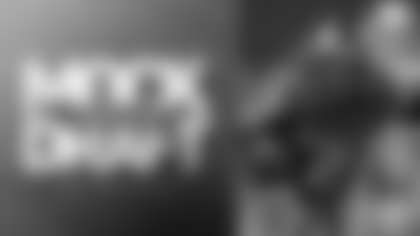Adam McCann is beginning to live his dream of working in the NFL. It took a harsh dose of reality, however, to open the door and allow that dream to come true.
McCann grew up just outside Cleveland, Ohio. He graduated from high school in 2003 and made the decision to join the Marine Corps. After boot camp and basic training, McCann and his company received news of their deployment, beginning January 1, 2005.
McCann spent January and February of that year in California, undergoing pre-combat training, before finally arriving in Iraq during the first week of March, 2005. His company was based out of a small camp just outside of Hit, Iraq, about 100 miles west of Baghdad.
"There were probably only 150 of us or so [stationed at the camp] and being that it was right outside of a major city, we took incoming mortars on a daily basis, probably five or six times a day," McCann said.
His company was sent out on missions into the city almost daily. It was less than two months after arriving in Iraq that one of those missions would be etched into his mind forever.
"We were in the city doing a raid, looking for a weapons cache. We happened to find several artillery shells packed with C-4 [explosives] and we were carrying those back to our vehicles," he said. "We were in a fire team wedge, which is a diamond shape, and I was the team leader so I was the front man. Next thing we know, we took an incoming mortar.
"The insurgents on the other side of the street shot six mortars at us and all six mortars impacted in the middle of our formation."
McCann and his three team members were injured, as the explosions shot shrapnel in every direction. McCann remembers being carried back to the vehicles by another Marine, then being taken to a helicopter waiting for them outside the city that transported them to what he describes as "a little tent hospital" in Taqaddum, Iraq.
McCann's injuries were severe.
"I took shrapnel to my neck, my left Achilles tendon was cut in two places and my right tibial tendon was severed," he said. "It was pretty much just hanging there."
McCann and his injured team spent the next month hospital-jumping. From Taqaddum they went to Baghdad, then to another tent hospital in Balad, Iraq, before arriving in Landstuhl, Germany a week after the injury. They spent a couple of weeks in Germany before returning to the United States, staying for a short time at Andrews Air Force Base in Maryland. They arrived at Camp Lejuene in North Carolina about a month after they sustained their injuries, and it was then that McCann's tibial tendon was finally reattached.
That month of hospital after hospital was strenuous, to say the least, and it was only the beginning of a long road to recovery for McCann.
"I've had one surgery on my neck, one surgery on my left leg and then six so far on my right leg," McCann said. "The first several surgeries were more or less shrapnel removal."
Both of McCann's legs were placed in casts and eventually he had to learn how to walk again.
"At first the doctors were telling me, 'You're not going to be able to walk.'" he said. "So my whole mindset was that I was going to prove them wrong, I was going to walk again."
Sure enough, McCann fairly quickly was able to walk again, but the doctors presented him with more doubt.
"They said, 'Well you're going to be in a wheelchair by the age of 35.' So that's kind of what my mindset is right now," the 24-year old said. "I'm going to prove them wrong once again."
It was during McCann's stay in Germany that he was contacted by the Wounded Warrior Project (WWP). Started in 2002 in Roanoke, Virginia, the WWP's staple action has been delivering backpacks full of clothing essentials and toiletries to military members who are wounded overseas. Such a small gesture is more appreciated than one might realize, as soldiers are left with nothing once they are transported to hospitals in other countries, and McCann is witness to this.
The WWP has since moved its headquarters to Jacksonville and has expanded its services.
"They do so much for all of us," McCann said, "with helping us out with our disability plans with the Veterans Affairs, and sending us on trips to get us out of the house to do activities that we didn't think we could do anymore because of our injuries."
It was through the WWP that McCann received the opportunity of a lifetime.
In 2008, McCann's WWP area outreach coordinator told McCann about a new program that was being offered by the WWP called the TRACK program. It was a program specifically designed for soldiers wounded in Iraq or Afghanistan who had no previous college, job, or trade school experience before joining the military.
The intent of the program is to give disabled veterans the opportunity to get their lives on track, offering a six-month session of basic college courses followed by a six-month externship session.
McCann is a member of the second class to go through the TRACK program, a class of only six. With such a small number of students in the program, there is a great deal of opportunity for specialized attention and instruction.
"When we first started the program, it's pretty much tailor-made to what I want to do," McCann said. "My dream is to be in the NFL so before I signed up for the program, I told them I wanted the Jacksonville Jaguars."
He got the Jacksonville Jaguars.
McCann's externship, as it is called because it is paid by the WWP and not the Jaguars, has immersed him in almost every department in the Jaguars organization: human resources, scouting and player personnel, equipment, football operations, fan services, special events, video, accounting, and ticketing.
"The only thing I really haven't done is coaching," McCann said. "I love it. The NFL is my dream. It's unfortunate that it took me being injured in Iraq to get me here, but at least I'm finally here."
With his varied responsibilities, McCann has many places to be during a work day at Jacksonville Municipal Stadium. He zips around the offices and practice fields on a Segway, given to him as a part of the Segs4Vets program by Disability Rights Advocates for Technology (Draft). It allows him to do all of his daily duties without overstressing the tendons and ligaments in his lower legs, which cause him pain after over-use.
McCann's interest in the NFL as a job possibility was launched earlier when he had the opportunity to meet the Cleveland Browns owner, Randy Lerner, through Lerner's friend, General James Amos, who visited McCann in the Camp Lejuene hospital. General Amos told Lerner about McCann, and on McCann's first day back home in Cleveland, Lerner set it up so McCann could spend the day with him at the Browns' facility.
McCann got to meet many people in the Browns organization including then-head coach Romeo Crennel. He received the VIP experience from the Browns in 2006, and the wife of former general manager Phil Savage even gave McCann season tickets, which he owns to this day.
The opportunity had a profound impact on McCann, who had always been a Browns fan.
"That really encouraged my dream of the NFL," he said.
The experience McCann is gaining with the Jaguars continues to shape his dream and at this point, he doesn't exactly know to what area it will lead him.
"My goal before I started working for the Jaguars was to eventually become a head coach or general manager someday," McCann said. "As of now, I think I might like to shift my focus more towards special events or football operations."
He also doesn't know geographically where the NFL will lead him. Like many veterans who return from combat situations, McCann suffers from Post-Traumatic Stress Disorder (PTSD). Because of this, McCann says it is best for him to be in places that are comfortable and familiar to him.
"A perfect situation would be to go back to Cleveland and get in with the Browns [when TRACK ends], only because I have my family and my friends," he said. "My family and my friends are like my security blanket, my comfort zone."
But he also says that Jacksonville has great positives as well.
"The Jaguars are the first team to give me an opportunity and I love everyone I work with," McCann says. About the possibility of continuing his stay in Jacksonville, he adds "staying with the Jaguars wouldn't be a bad thing at all."
McCann is thankful to many for the opportunities that he's been given, starting with the WWP.
"I'm greatly appreciative, not only because they've helped me out in so many ways, but they've helped open the door to getting in with the Jaguars," he said. "I'm also greatly appreciative of the Jaguars for letting me in – everyone I work with."
McCann's final day of TRACK is December 18th, and no matter where he goes from there one thing is certain.
"The Jaguars are always going to have a place in my heart because they were the first NFL franchise to give me that chance," he said.














